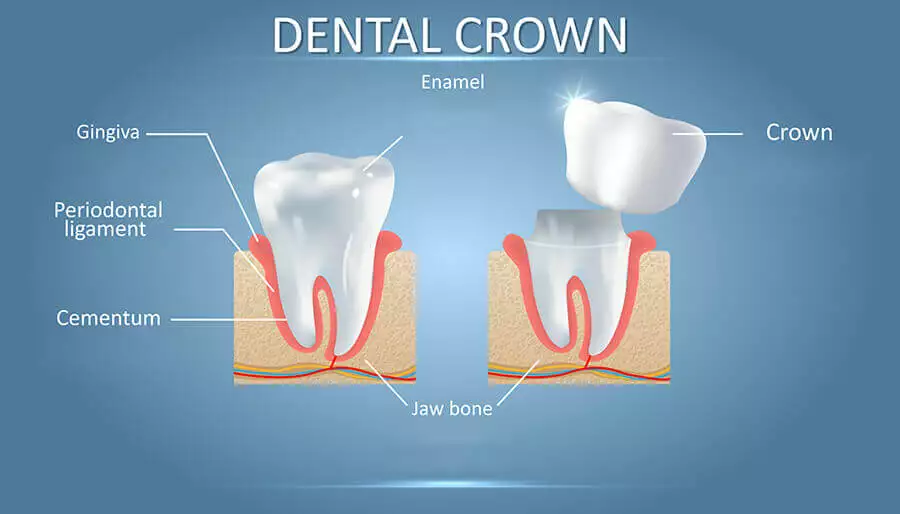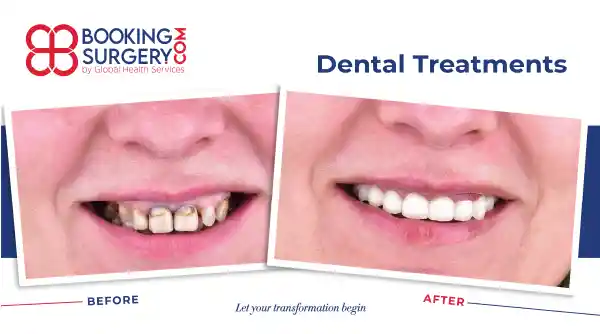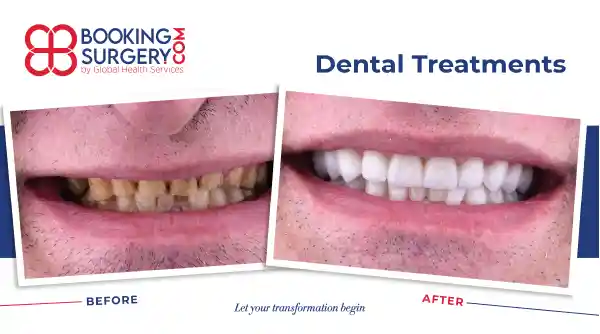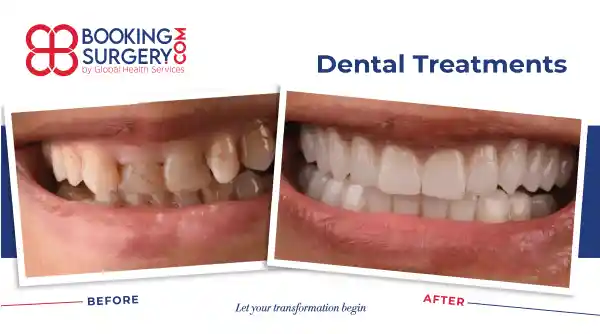
Dental Crowns
What are Dental Crowns?
Dental crowns are tooth shaped caps that are permanently cemented on top of the natural teeth or dental implants. Dental crowns strengthen the teeth and improve the alignment of the mouth. Permanent dental crowns can be made out of many different materials.
Why are Dental Crowns performed?
Dental crowns can be applied for multiple purposes, both for dental health or for cosmetic purposes. Crowns are often applied to:
- Restore a broken tooth
- Hold a dental bridge in place
- Support a tooth undergoing a root canal treatment or a tooth that has a large filling
- Cover a dental implant
- Cover misshapen or stained teeth
- Keep a weak tooth together and to keep it from breaking
What are the conditions for dental crowns?
Dental crowns are recommended to patients who have broken, misshapen, chipped, or discolored teeth. Patients that have a problem with continuously grinding their teeth might not benefit fully from dental crowns as their lifespan will be greatly reduced.
What are the types of Dental Crowns?
There are multiple types of dental crowns where each is defined by the material that the dental crown is made up from.
Porcelain fused metal crowns
Porcelain fused metal crowns consist of a metal inlay that is coated with a thick layer of porcelain. The metal base ensures long-lasting strength and gives a longer lifespan to the crown, while the porcelain material provides an aesthetically pleasing appearance. This type of crown can also be used to make a dental bridge if the patient has more than one missing tooth near each other.
Zirconium Crowns
Zirconium crowns are one of the most popular types of crowns and have many advantages over Porcelain fused metal crowns. Zirconium crowns are able to provide a more natural looking appearance while having a smooth, shiny surface with an optimal color and light transmittance. Zirconium crowns are biocompatible, making them harmless to living tissue and allowing them to stay in the body indefinitely
E-Max Crowns
E-Max crowns are made from lithium disilicate material, and are made from a single block, which makes them as strong and resistant to chipping or breaking as Zirconium Crowns. E-Max crowns are slightly translucent, providing a natural appearance and fit perfectly with other teeth.


What are the things to be considered before Dental Crowns?
The patient’s health history is taken, and it, along with additional information that may be requested, is examined to create a treatment plan for the patient. After the patient arrives in Turkey a thorough dental examination is made and includes extensive blood work to determine what kind of sedation the patient should go under. A mold of the teeth are also made to create a crown that exactly fits the patient’s mouth.
How are the Dental Crowns inserted?
Patients will usually need 2 to 3 visits to the dentist to have the dental crowns inserted. The first appointment involves the teeth that will receive the crown being filed down across the top and the sides, making space for the crowns. The amount of tooth that gets filed away depends on the type of crown. In some cases root canal treatment might need to be administered if the teeth have an elevated risk of infection or decaying. After filing down, necessary measurements will be taken for the crowns to be manufactured according to. On the second visit dental crowns will be cemented. In some cases a mid session might be needed to check and make the necessary adjustments.
Dental crowns usually last 5 to 15 years if taken care of properly.
What are the things to be considered after getting Dental Crowns?
Patients are recommended to diligently follow their cosmetic dentist’s instructions, which includes taking provided prescription medicine. The patients should also take care to avoid hard or sticky foods, as well as chewing gum, for at least the first 24 hours after the procedure. The patients are also recommended to brush their teeth gently for a week after the procedure. After the recovery period, the patients should keep good dental hygiene and avoid putting excess pressure on the teeth, through grinding or using teeth to open packaging for example. Otherwise the expected lifespan of the crown might decrease.
What are the risks of Dental Crowns?
While dental crowns are considered one of the safest cosmetic dental procedures, like with any other major procedure, there is a risk of complications. Potential risks of dental crowns include, but are not limited to:
- Discomfort or excessive sensitivity to changes in temperature.
- The dental crown chipping, getting loose, or dropping off.
- An allergic reaction to the material that the dental crown is made up of.
- Gingivitis or other gum diseases.

